- Home
- /
- Academics
- /
- College of Liberal Arts and Education
- /
- Liberal Arts and Humanities Division
- /
- Music
- /
- Music Auditions and Scholarships
Music Auditions and Scholarships
All students wishing to be accepted to programs leading to a Bachelor of Music in Music Education, Bachelor of Arts in Music, or a music minor must audition for the Music Department faculty. Students must audition in-person or submit a recorded video audition.
All students who audition for the Music Department will be automatically considered for a music scholarship.
Join us at SXU by completing the following steps:
- Complete your application to SXU with the Office of Admission.
- Schedule an audition date via our Online Application.
- Complete and return a Letter of Recommendation Form (PDF) via email at musicFREESXU.
The audition dates for the 2024-2025 are:
- November 9, 2024
- February 15, 2025
- March 22, 2025
- April 26, 2025
Scholarship Opportunities
A student wishing to study as a music major or minor must audition for admission to the Music Department as a music major or music minor candidate. Music scholarships and talent awards are available and are renewable each academic year based on continued study and earned GPA. Music scholarships are also available to non-majors for ensemble participation based on playing and/or singing ability and ensemble need. Ensemble participation scholarships are open to all students regardless of major, but an audition is necessary.
In addition to music scholarships students may receive other forms of Financial Aid, including Presidential Scholarships, Leadership Scholarships, need- and merit-based grants, work study awards and student loans.
For further information about admission or scholarships, please contact the Music Department at 773-298-3448.
Learn MoreAuditions for admittance to the Saint Xavier University Music Department will consist of the following:
- Demonstration of major scales up to 3 sharps and 3 flats (preferably two octaves or more) and a full-range chromatic scale. Percussionists should prepare as many of the PAS 26 American Drum Rudiments as possible.
- Sight-reading
- Prepared solo or two études of contrasting styles (i.e. technical and lyrical)
- Students wishing to pursue a B.A. in Jazz & Commercial Emphasis see Jazz/Commercial audition requirements
- All pianists should follow the audition requirements listed under Piano, for the B.A., B.M. or minor.
Each audition should contain 6-8 minutes of music and take approximately 15 minutes.
Preparation
- Standard Repertory: One or more solo or étude excerpts that demonstrate technical proficiency on the ones instrument as well as musicality, ideally in contrasting styles. The ILMEA audition materials from the current or previous years may be used as part of the audition; other examples may be found below. The pieces do not have to be memorized. If you are preparing repertoire for another audition, you may use that music for your SXU audition.
- Scales: It is expected that the music student would know at a minimum the major scales through three sharps and three flats (minimum) and a chromatic scale. These scales should be performed from memory and should include the full range of the instrument. Students who do not know these scales are still encouraged to audition, but they should expect to learn them quickly upon admission to the Music program.
- Sight-reading: The best way to "practice" sight-reading is to sight-read regularly, paying close attention not only to notes and rhythms but also to dynamics, articulations, and other musical nuances.
- Pitch Matching: Students will be asked to sing back a series of notes played to them.
Instruments
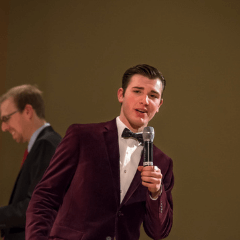
Voice
Audition Requirements
All prospective majors and minors who select voice as their principal area of applied music study must audition for the music faculty.
Digital copies of audition repertoire should be sent to music@sxu at least two weeks
prior to audition date.
In addition to a brief interview with faculty, major and minor applicants should expect to:
1.Perform prepared memorized solo literature.
- Two classical art songs, or one classical art song and one aria. (See Suggested Repertoire)
- Pieces should be contrasting in style.
- Preferably one piece should be in English and one in another language: Italian, German, French, Spanish, Latin, etc.
2. Sight read selected short examples, a cappella.
3. Demonstrate tonal skills.
-
- Sing several melodic intervals (of two or more notes) after hearing them played from the keyboard.
- Sing individual notes from a triad after hearing it played from the keyboard.
*An accompanist will be provided for the audition at no cost to the student.

Voice
Suggested Repertoire Sources
Other sources are permissible, though selections should demonstrate similar skill level.
Questions should be directed to Professor McNichols, tmcnicholsFREESXU.
1. Compiled by: Joan Frey Boytim, Publisher: G. Schirmer
- First or Second Book of Baritone/Bass Solos
- First or Second Book of Mezzo-Soprano/Alto Solos
- First or Second Book of Soprano Solos
- First or Second Book of Tenor Solos
2. Editor: Dallapiccola: Vols I, II, High, Medium, Low; Publisher: International
- Italian Songs of the 17th and 18th Centuries
3. Publisher: G. Schirmer
- 24 Italian Song
4. Publisher: Alfred
- 26 Italian Songs and Arias
5. Publisher: G. Schirmer
- Operatic Anthology, Volume I. Soprano
- Operatic Anthology, Volume II. Mezzo-Soprano
- Operatic Anthology, Volume III. Tenor
- Operatic Anthology, Volume IV. Baritone
- Operatic Anthology, Volume V. Bas
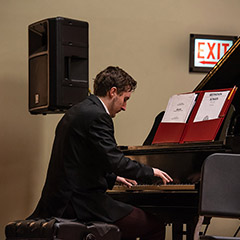
Piano
Audition Requirements
B.A. Music, B.M. Music Education and Music Minor
All prospective majors and minors who select piano as their principal area of applied music study must audition for the music faculty.
1. Perform prepared solo literature. Choose 2 of the following 3 categories:
- A piece by J.S. Bach, such as a Two-Part Invention, a Prelude and Fugue or a movement of a suite.
- A fast (Allegro) movement of a sonata or sonatina by Beethoven, Haydn, Mozart or Clementi.
- A short piece representative of the romantic, impressionist or contemporary periods, such as compositions by Chopin, Schumann, Schubert, Debussy, Ravel, Bartok, Prokofiev or other composers.
2. Perform major and harmonic minor scales, hands together in parallel motion, minimum 2 octaves.
3. Sight read selected short examples from standard piano literature.
Flute
Sample Solo Literature:
- Bach - Sonatas. Any.
- Bloch - Suite Modale
- Cavally - 24 Short Concert Pieces. Any.
- Enesco - Cantabile et Presto
- Gluck - Dance of the Blessed Spirits
- Handel - Sonatas. Any.
- Hindemith - Sonata. Any movement.
- Honegger - Danse de la Chevre
- Mozart - Andante in C
- Mozart - Concertos in D-Major or G-Major. Any two movements.
- Quantz - Concerto in G (1st movement)
- Various - Flute Music by French Composers. Any piece.
Sample Études
- Andersen - Op. 41.
- Berbiguier - 18 Studies
- Boehn
- Cavally 24 Short Concert Pieces (Southern)
- Cavally - Melodious and Progressive Studies
- Clardy - Flute Études Book
- Kohler
- Donald Peck - 36 Repertoire Pieces for Solo Flute (Schirmer)
- Flute Music by French Composers (Schirmer)
Other possibilities might include:
- All-state or district tryout music
- A solo (other than one above) used for solo and ensemble festival
Oboe
Sample Solo Literature
- Albinoni - Concerto. Any movement.
- Cimarosa - Concerto
- Grovlez - Sarabande et Allegro
- Handel - Concerto. Any movement.
- Handel - Sonata in C minor
- Hindemith - Sonata. Any movement.
- Marcello - Concerto
- Schumann - Three Romances
- Still - Incantation and Dance
- Telemann - Any Sonata.
- Vivaldi - Concerto. Any movement.
Sample Études
- Arnold - Oboe Solos
- Barrett - Any melodic study
- Ferling - 48 Famous Studies for Oboe or Saxophone
- Gekeler - Oboe Method - Book 2
- Voxman - Concert and Contest Collection for Oboe
- Voxman - Selected Studies for Oboe
- Voxman - Rubank - Intermediate or Advanced Method
Other possibilities might include:
- All-state or district tryout music
- A solo (other than one above) used for solo and ensemble festival
Clarinet
Sample Solo Literature
- Christmann - Solos for the Clarinet Player (choose 1)
- Hindemith - Sonata. Any two movements.
- Finzi - Five Bagatelles
- Jacob - Five Pieces
- Mozart - Clarinet Concerto, K. 622. (any movement)
- Rabaud - Solo de Concours
- Schumann - Fantasy Pieces, Op. 73. (any movement)
- Stamitz - Concerto No. 3
- Vaughan Williams - Six Studies on English Folk Songs
- Weber - Concertino
- Weber - Concerto No. 1 or No. 2 (any movement)
Sample Études
- Cavallini - 32 Caprices
- Rose - 32 Études
- Rose - 40 Studies
- Hite - Artistic Studies, Book 1 - From the French School
Other possibilities might include:
- All-state or district tryout music
- A solo (other than one above) used for solo and ensemble festival
Bassoon
Sample Solo Literature
- Bourdeau - Premier Solo
- Galliard - Sonata. Any.
- Hindemith - Sonata. (any movement)
- Mozart - Concerto, K. 191. (any movement)
- Pierne - Concertpiece
- Philips - Concertpiece
- Stevens - Three Pieces. (any movement)
- Telemann - Sonata
- Vivaldi - Concerto (any movement)
- Weber - Concerto. (any movement)
Sample Études
- Milde - Concert Studies. Any.
- Weissenborn - 50 Bassoon Studies or Practical Method for Bassoon. Any.
- Sharrow - Master Solos for Bassoon
Other possibilities might include:
- All-state or district tryout music
- A solo (other than one above) used for solo and ensemble festival
Saxophone
Sample Solo Literature
- Bozza - Aria
- Bozza - Impromptu et Danse
- Bozza - Improvisation et Caprice
- Creston - Sonata. Any movement.
- Debussy/Rousseau - Rhapsody
- DuBois - Concerto. Any movement.
- Handel/Rascher - Sonata III or XIII
- Hartley - Concerto
- Heiden - Sonata
- Hindemith - Sonata
- Ibert - Concertino da Camera
- Lantier - Sicilienne
- Lunde - Sonata
- Maurice - Tableaux de Provence
- Rueff - Chanson et Passepied
- Singelee - Concertino
- Still - Romance
Sample Études
- Ferling/Mule - 48 Studies
- Berbiguier/Mule - 18 Studies
- Gatti/Iasilli - 35 Melodious Technical Exercises
- Voxman - Selected Studies for Saxophone
Other possibilities might include:
- All-state or district tryout music
- A solo (other than one above) used for solo and ensemble festival
Trumpet
Sample Solo Literature:
- Barat: Andante et Allegro
- Goedicke: Concert Étude
- Haydn: Concerto for Trumpet
- Hindemith: Sonata for Trumpet
- Hummel: Concerto for Trumpet
- Ligeti: Mysteries of the Macabre
- Ropartz: Andante et Allegro
- Voxman - Concert and Contest Collection for Cornet
Sample Études:
- Arban: Complete Method for Trumpet - Characteristic Studies. Any study.
- Bousquet: Thirty-Six Celebrated Studies
- Charlier: 36 Études
- Clarke - Any characteristic étude or study.
- Concone: Lyrical Studies
- Getchell: Second Book of Practical Studies
- Hering - Any étude.
- P. Smith - Concert Studies for Trumpet
- Vannetelbosch: Études
- Voxman - Rubank Advanced Method for Cornet or Trumpet, Vol. 1
- Voxman - Selected Studies
Other possibilities might include:
- All-state or district tryout music
- A solo (other than one above) used for solo and ensemble festival
French Horn
Sample Solo Literature
- Beethoven - Sonata for Horn
- Dukas - Villanelle
- Heiden - Sonata
- Hindemith - Concerto
- Hindemith - Sonata
- Jones - Solos for the Horn Player
- Mozart - Concertos 1, 2, 3, or 4, or Concerto Rondo. Any 1 movement.
- Saint-Saens - Concertpiece (Morceau de Concert)
- F. Strauss - Nocturno or Concerto, Op. 8
- R. Strauss - Concerto No. 1 (1st movement only)
Sample Études
- Gallay
- Kling
- Kopprasch - Sixty Selected Studies for Horn
- Maxime-Alphonse - 200 Études Nouvelles (Vol. 1, 2 or 3)
- Miersch
- Pottag - 335 Melodious Progressive, and Technical Studies,
- Pottag - Preparatory Melodies to Solo Work
- Shoemaker - Legato Études for French Horn
Other possibilities might include:
- All-state or district tryout music
- A solo (other than one above) used for solo and ensemble festival
Much of the above music is available as a free download.
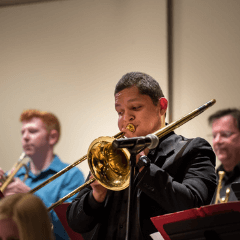
Trombone
Sample Solo Literature
- Barat - Andante et Allegro
- Blazevich - Concerto No. 1 or Concerto No. 2
- Corelli - Sonata in c minor
- David - Concertino
- De La Nux - Concert Piece
- Galliard - any one of the six sonatas
- Grondahl - Concerto. Any movement.
- Guilmant - Morceau Symphonique
- Jacob - Concerto. Any movement.
- Rimsky-Korsakov - Concerto for Trombone
- Ropartz - Andante et Allegro
- Rousseau - Concert Piece
- Saint-Saens - Cavatine
- C. Smith - Solos for the Trombone Player
- Voxman - Rubank Concert and Contest Collection for Trombone
Sample Technical Études
- Arban - Complete Method for Trombone or Baritone
- Blume - 36 Studies for Trombone
- Bordner - Practical Studies for Trombone - books 1 and 2
- Kopprasch - Sixty Selected Studies for Trombone
- Paudert - 24 Studies for Trombone
- Tyrell - 40 Progressive Studies
Sample Lyrical Études
- Bordogni/Rochut Melodious Études - Book I
- Cimera 55 Phrasing Studies for Trombone
- Fink Studies in Legato
Other possibilities might include:
- All-state or district tryout music
- A solo (other than one above) used for solo and ensemble festival
Euphonium
Sample Solo Literature
- Barat - Andante et Allegro
- Barat - Introduction and Dance
- Galliard - Sonatas
- Guilmant - Morceau Symphonique
- Handel/arr. Fitzgerald - English Suite
- Marcello - Sonatas
- Mozart - Concerto for Bassoon. 1st or 3rd movement.
- Ropartz - Andante et Allegro
Sample Études
- Arban - Complete Method for Trombone or Baritone (14 Characteristic Studies)
- Blazhevich - 70 Studies for Tuba - Books 1 and 2
- Blume - 36 Studies for Trombone
- Bordner - Practical Studies for Trombone - Books 1 and 2
- Bordogni/Rochut - Melodious Études for Trombone - Book 1
- Bousquet - 36 Celebrated Studies for Euphonium
- Getchell - Practical Studies for Tuba - Books 1 and 2
- Kopprasch - Sixty Selected Studies for Trombone (and Tuba)
- Paudert - 24 Studies for Trombone
- Tyrell - 40 Progressive Studies for Trombone (and Tuba)
- Voxman/Gower - Rubank Advanced Method - Trombone or Baritone
- Voxman - Selected Studies for Baritone BC/Euphonium
- Tubists may use any version of Bordogni Vocalises*
Other possibilities might include:
- All-state or district tryout music
- A solo (other than one above) used for solo and ensemble festival
Tuba
Sample Solo Literature
- Bach/arr. Bell - Air and Bouree
- Barat - Introduction and Dance
- Curnow - Concertino
- Galliard - Sonatas
- Gregson - Tuba Concerto. 1st movement.
- Haddad - Suite for Tuba (1st movement)
- Marcello - Sonatas
- Vaughan-Williams - Concerto in f-minor
- Vaughan Williams - Six Studies in English Folksong
- Voxman - Concert and Contest Collection for Tuba
- Wilder - Suite No. 1 for Tuba (Effie)
Sample Études
- Arban - Complete Method for Trombone or Baritone
- Blazhevich - 70 Studies for Tuba - Books 1 and 2
- Blume - 36 Studies for Trombone
- Bordner - Practical Studies for Trombone - Books 1 and 2
- Bordogni/Rochut - Melodious Études for Trombone - Book 1
- Getchell - Practical Studies for Tuba - Books 1 and 2
- Grigoriev - 78 Études
- Kopprasch - Sixty Selected Studies for Trombone (and Tuba)
- Paudert - 24 Studies for Trombone
- Tyrell - 40 Progressive Studies for Trombone (and Tuba)
- Tubists may use any version of Bordogni Vocalises*
Other possibilities might include:
- All-state or district tryout music
- A solo (other than one above) used for solo and ensemble festival
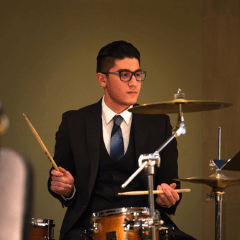
Percussion
Audition Requirements
Solos: Auditionees must choose one snare solo and one mallet solo (marimba or xylophone.)NOTE: The timpani skill level test is also required of students interested in music as a major.
- A timpani solo may be performed but is optional.
- Keyboard solos with two mallets are required. 4 mallets are optional
- A multiple percussion work may be substituted for the rudimental snare drum demonstration.
*Arrangements must be made in advance if there are additional instruments needed for a set-up. It is recommended that the student bring their own smaller instruments.

Percussion
Suggested Repertoire
Sample Snare Solos/Études
Symphonic
- Cirone - Portraits in Rhythm
- Delecleuse - Methode or Douze Études
- Peters - Intermediate Studies for Snare
Rudimental
- Markovich - Any individual solos
- Pratt - 14 Modern Contest Solos
- Wolcoxon - All-American Drummer
- Wooton - Dr. Throwndown's Rudimental Remedies
Sample Mallet Solos
Two Mallet (required)
- Bach, J.S. or other baroque/classical - transcriptions for flute, violin, or cello.
- Breuer
- Goldenberg - Modern School for Xylophone
- Green - Any rags
- Joplin - Any rags
- McMillan - Masterpieces for Marimba
- Whaley - Audition Études
Four Mallet (optional)
- Abe - Works for Marimba
- Gomez - Any
- Musser - Any transcriptions.
- Peters - Any
- Zivovic - Funny Mallet Series

Percussion
Timpani Skill Test
Demonstrate current ability to match/sing pitches and scales, tune timpani without the aid of a tuner, basic timpani stroke, dampening technique, rolling (single stroke), knowledge of drum sizes and ranges.
NOTE: These skills are not required for acceptance but are part of the audition to assess current ability level. However, the ability to sing and match pitches is required of music students in general and part of the timpani curriculum for percussion students.
Sample Timpani Études (optional)
- Firth - The Solo Timpanist
- Gay - Pedal to the Kettle
- Goodman - Modern Method for Timpani
- Peters - Fundamental Method for Timpani
- Schinstine - Tymp Tunes - Op. 41.
Drum set (optional)
- It is recommended to demonstrate as many drumming styles as to your current ability level. (i.e.: rock, jazz/swing, funk, Latin)
- You may also choose to perform a transcription of a jazz tune or another style that accurately represents your current ability level.
Violin
Sample Solo Literature:
- Accolay - Concerto
- Bach - Concerto No. 1 in a-minor
- Bach - Partita. One movement from any partita
- Handel - Sonata. Any
- Kriesler - Preludium and Allegro
- Viotti - Concerto No. 23
- Vivaldi - Concerto in g-minor
Sample Études:
- Kayser
- Kreutzer - 42 Studies. Any.
- Sitt
- Whistler - Prep. to Kreutzer. Any .
- Wohlfahrt - Op. 45
Other possibilities might include:
- All-state or district tryout music
- A solo (other than one above) used for solo and ensemble festival
VIOLA
Sample Solo Literature
- Bach - Cello Suite. Any movement
- Marais - Four French Dances
- Marcello - Sonata in G-Major
- Telemann - Concerto in G-Major
- Vivaldi - Concerto in d-minor
Sample Études
- Kayser
- Kreutzer - 42 Studies. Any
- Sitt
- Whistler - Prep to Kreutzer. Any
- Wohlfahrt - Op. 45
Other possibilities might include:
- All-state or district tryout music
- A solo (other than one above) used for solo and ensemble festival
Cello
Sample Solo Literature
- Bach, J.S. - Cello Suites 1, 2, or 3. Any movement.
- Bach, J.S. - Prelude. Any.
- Breval - Sonata in G-Major. Any movement.
- Dvorak - Concerto. Any movement.
- Elgar - Concerto. 1st or 2nd movement.
- Haydn - Concerto in C-Major. 3rd movement.
- Haydn - Concerto in D-Major. 1st or 3rd movement.
- Saint-Saens - Concerto. Any movement.
Sample Études
- Grutzmacher - Book 2 (Nos. 13 through 24). Any.
- Popper - High School of Cello Playing
Other possibilities might include:
- All-state or district tryout music
- A solo (other than one above) used for solo and ensemble festival
Bass
Sample Solo Literature
- Capuzzi - Concerto in F. Any movement.
- Corelli - Sonata. Any.
- Johnson - Lento and Zapateado
- Marcello - Sonata. Any
Sample Études
Other possibilities might include:
- All-state or district tryout music
- A solo (other than one above) used for solo and ensemble festival
Classical Guitar
Sample Solo Literature
Preludes, Dances, and other Lyrical Works
- J.S Bach
- Manuel Ponce
- Francisco Térrega
- Leo Brouwer
- Heitor Villa-Lobos
Sample Études
- Fernando Sor
- Mauro Giuliani
- Ferdinando Carulli
- Diosinio Aguado
Other possibilities might include:
- All-state or district tryout music
- A solo (other than one above) used for solo and ensemble festival
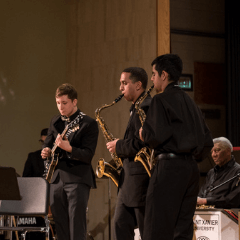
Jazz & Commercial Music
All students wishing to pursue the Bachelor of Arts with a Jazz & Commercial Emphasis
music must prepare the following for your audition submission. The songs listed are
recommendations, other repertoire in similar styles will be accepted.
If auditioning in-person, an accompanist will be provided or you may use a play-along.
If submitting a recording, please record yourself with a play-along accompaniment
track (Aebersold tracks or iReal Pro App are acceptable.)
Select two pieces, two contrasting styles, from the following:
- 12-Bar Blues: "Now's The Time," "Blue Monk," "Billie's Bounce," "Straight No Chaser," "Tenor Madness," "Mr. P.C."
- Medium Up-Tempo Swing and/or Latin/Bossa Nova (mm. 120+): "Satin Doll," "Take the 'A' Train," "All the Things You Are," "Autumn Leaves," "Blue Bossa," "Recorda-Me," "Wave."
- Up-Tempo Bebop (mm. 180+): "Oleo," "Anthropology," "Ornithology," "Blues for Alice," "Scrapple from the Apple," "Donna Lee," "Joy Spring."
- Ballad (piano/guitar/vibraphone may prepare a chordal-melody arrangement: "Body and Soul," "Misty," "In a Sentimental Mood," "My Foolish Heart."
- Waltz, 3/4 or 6/8 time signature: "All Blues," "Bluesette," "Someday My Prince Will Come," "Up Jumped Spring," "Footprints."
- Funk, Rock, R&B, Pop, Gospel: "Chameleon," "Watermelon Man," "Strasbourg/St. Denis," "Moondance," "Just the Two
of Us," "Sir Duke."
Other repertoire that may be accepted:
- Students perform an original composition, vocal or instrumental. A notated lead sheet, with full melody, harmony/chords, and lyrics, music be provided at the audition.
- Jim Snidero's "Jazz Conception Series" or other festival and IMEA audition pieces-state or district tryout music

Drum-Set
Audition Requirements
Play approximately 1 minute from the following musical styles:
- Medium Swing: Tempo at between 140 and 180
- Up-Tempo Swing: Tempo between 200-240
- Bossa, Samba, or Salsa Groove: Tempo your choice
- Jazz Waltz, ¾ or 6/8 Swing: Tempo 120+
- Funk, Rock, or other Straight 8th Groove: Tempo your choice
- Demonstrate ability on mallets. You may play one jazz piece on vibraphone (see jazz vibraphone requirements) or a classical étude (see classical requirements for suggestions)
Improvisation over "Tenor Madness" - Swing, Tempo 180:
- Play the melody on the kit 2 times (use various parts of the drum kit to replicate the melody as you best hear it)
- Play time for one chorus
- Second and Third chorus trade 4s -solo over 4 bars, time for 4 bars
- Play the melody one time out
Woodwind and Brass
Audition Requirements
Choose two songs of contrasting style to perform or submit a recording for your audition.
NOTE: You may submit more than two if you would like.
- Play the melody and improvise over the form and chord changes.
- Improvise over at least 3 choruses of a blues and two choruses of a 32-bar song.
- Play the melody once again for your final chorus.
Piano
Audition Requirements
Choose two songs of contrasting style to perform or submit a recording for your audition.
NOTE: You may submit more than two if you would like.- Play the melody in the right hand and demonstrate comping the harmony (playing the chords) in the left hand.
- Improvise over at least 3 choruses of a blues and two choruses of a 32-bar song.
- Play one chorus of just the chords (both hands) over the form.
- Play the melody once again for your final chorus.
Guitar and Vibraphone
Audition Requirements
Choose two songs of contrasting style to perform or submit a recording for your audition.
NOTE: You may submit more than two if you would like.
- Play the melody and improvise over the harmony and form.
- Improvise over at least 3 choruses of a blues and two choruses of a 32-bar song.
- Play one chorus of just the chords over the form.
- Play the melody once again for your final chorus.
Bass
Audition Requirements
Choose two songs of contrasting style to perform or submit a recording for your audition.
NOTE: You may submit more than two if you would like.
- Play the melody, walk a bass line, and improvise over the harmony and form.
- Improvise over at least 3 choruses of a blues and two choruses of a 32-bar song.
- Walk two choruses of a bass line for a blues selection, one chorus for all other selections.
- Play the melody once again for your final chorus.
For Prospective Music Majors and Minors
All perspective students may schedule a private lesson, in-person or via Zoom, with
one of our applied instructors prior to their audition. Students may also schedule
a Visit Day to SXU to shadow a current music student, attend classes, sit-in on rehearsals,
and visit with our faculty.
Contact our Music Admissions Coordinator for any questions, schedule a lesson, or
join us for a visit at musicFREESXU.